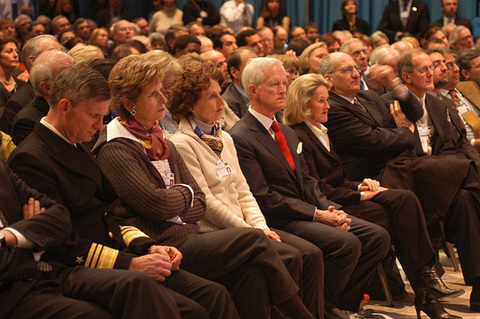The Politics of Perfume at Davos & Elsewhere In The World {The 5th Sense in the News}

World leaders gathering at the World Economic Forum in Davos summit next week will be subjected collectively, whether they like it or not, to the subtle atmospheric pressures of perfumes diffused in rooms to enhance the spirit of the meetings and influence the moods and emotions of delegates. In a possible and hopefully milder redux of the collective craze engendered by the virgins' perfume in the novel and movie Perfume, one might see people bond together once more through the sense of smell. Knowing that perfumer Christopher Laudamiel is behind this operation, reinforces the connection as he is the one who had to think about creating such a perfume for the Thierry Mugler coffret.
There is something in the Zeitgeist as people are becoming more and more interested in applying pre-tested olfactory marketing tools to momentous political events. The Korean presidential campaign last fall was premised upon that concept and a perfume called Great Korea was sprayed in meeting places to garner winning votes; Lee Myung-Bak eventually won. The Catalan Socialist Party also just launched a perfume in January of 2008 called "what does socialism smell like?", a deeply introspective scent, which they recommend using also outside of political meetings, for example " in offices to create a pleasant environment of equality and fairness." The US presidential candidates must be using this guerilla tactic otherwise they would really be behind, but they are not saying anything. In the midst of this efflorescence of political agendas expressed via perfume compositions, the question we asked in our post My National Parfum in the summer of 2006 when it felt like sci-fi still holds: can the intent of a perfume be interpreted in the same manner by everyone involved, across cultures and personal histories if scent is also about associations?.......
Going back to Davos, at the core, there is an Inca concept called "Mutqqichini" which means "smelling together". Christophe Laudamiel created 8 scents, such as Glacier, a scent born out of concern for the shrinking Arctic ice cap, or, Happiness meant to promote general harmony,
"Laudamiel's mission is to create and circulate aromatic moments that evoke the intimacy of the meeting, while helping delegates solve global calamities against a backdrop of crisis. Paramount among what the WEF's 2008 program portrays as a global ``contagion'' is the fallout from lenders marking down more than $80 billion after a surge in U.S. subprime mortgage defaults.
``The aroma of subprime is an interesting concept, and that's one of the reasons I'm fragrancing the rooms,'' Laudamiel says. ``I want my perfumes to overcome the gloom. [...]
`The best the WEF can hope for,'' McKee reckons, ``is a fragrance that will make everyone in Davos start loving each other again.''
Roberto Ascoli, a professional perfumer and president of the French fragrance company Symrise SA, advises nasal vigilance.
``It's yet to be proven that any perfume injected into a room can create an atmosphere for world leaders to solve problems,'' Ascoli says. ``There may be other smells that overpower the perfumes. Anybody in the Congress Center who sweats a lot will immediately destroy the aroma.''
Image: Wikimedia









